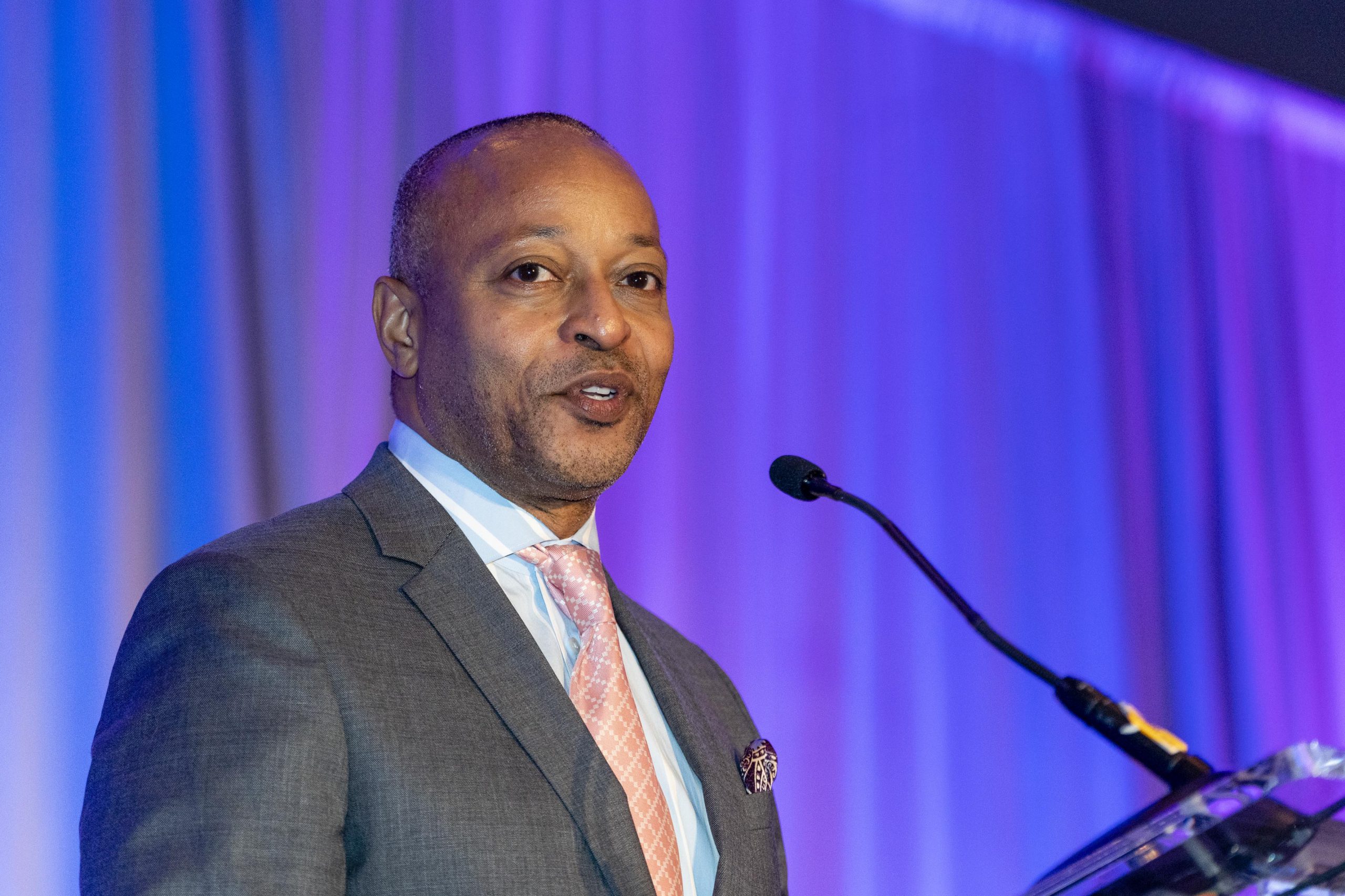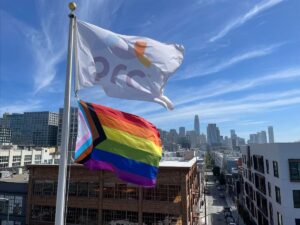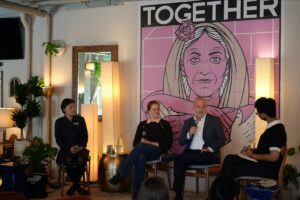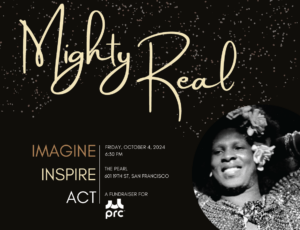An interview with retiring PRC CEO Brett Andrews

After two decades of visionary leadership, PRC’s Chief Executive Officer Brett Andrews has decided to retire. Since stepping into the role in 2003, Brett has grown PRC from a staff of 18 and an annual operating budget of $1.25 million to a staff of more than 300 and an annual budget of more than $30 million.
Brett’s dedication and passion for improving the lives and the health and economic outcomes of thousands of San Francisco’s most vulnerable adults have been truly inspirational to those of us who have had the honor to work alongside him. He has given us the confidence to continue his legacy, For that, we are eternally grateful and ready to carry on. As Brett hands over the reins to a new era of leadership, we couldn’t pass up the opportunity to celebrate him and thank him for his service. Brett will receive PRC’s inaugural Lifetime Achievement Award during this year’s Mighty Real Gala on Friday, November 4. We look forward to sharing this heartfelt moment with our community.
Before his official departure, we took the opportunity to sit with Brett to get a glimpse of what the past 20 years have been like. We invite you to read what Brett had to share about the lessons he’s learned along the way. We hope you find his reflections to be as insightful as we do.
As you reflect on your 20 years with PRC, what stands out to you the most?
“In the beginning, one thing really stood out to me. San Francisco was the first city — particularly at PRC — where I saw folks go out of their way to volunteer. There was a devoted core at PRC and so many other nonprofits who, every time you looked up, were donating their time. Volunteering is one of the hardest things to get people to do, yet there was this massive bank of volunteers, whether it was for Folsom Street, Dore Alley, the Richmond/Ermet Aid Foundation’s, Help is on the Way fundraising gala, or the Academy of Friends, these wonderful folks were always there. I just marveled at how many people — beyond what they needed to do in order to keep their life moving forward — were willing to volunteer in the nonprofit sector. That remains something that is extraordinary to me.”
What accomplishments of PRC are you most proud of?
“There was an early decision we made as a board and staff that the work we were doing in HIV was relevant to a broader population. In 2004, we formally expanded our mission beyond HIV. The work of what was then the Benefits Counseling Program and Employment Services is now Legal Advocacy and Workforce Development. If it was beneficial and helpful to one population that was disabled, we knew it was relevant for another population, and that was behavioral health. Through making that pivotal move, we were able to serve a larger population. But it also availed us of many great opportunities. I think we were successful in taking advantage of those opportunities, and they allowed us to create the organization that we have today. It’s because we took that big bold move that more people have been able to benefit from our services.”
Who have been the community leaders who have inspired you the most along the way?
“Senator Mark Leno stood out to me early on. He’s gracious, and he’s generous. I remember receiving two lovely handwritten notes in 2003 when I first came to PRC; One from Gavin Newsom, the mayor at the time, and another from Mark Leno, when he was an assembly member that said, “Good luck to you! We really love and believe in PRC, and its important services.” Mark later invited me to the state building to talk about his interests, my vision, and what my vision was for PRC. Mark has always been a valued thought partner, which one needs because the Chief Executive Director’s role is unique in that sometimes you only have yourself. You have a board of directors that you’re seeking to show a great deal of confidence and leadership. You have staff and other stakeholders who believe in you and the vision, and then where do you go when there’s indecision? Where do you go when you’ve reached a crossroads where you really could benefit from some counsel and have it not impact who you are as a person or a leader? And I found Mark Leno to be that for me over the years. I very much appreciate him for his thought leadership, thought partnership, and just the way in which he moves in the world with an open heart, kindness, and humanity.”
You are known for your ability to give inspiring speeches. What advice do you have for somebody that would like to be as skilled a speaker as you are?
“For me, it was both a personal and a professional journey toward authenticity. I look back at times when I gave speeches or remarks at galas or commencements, and the best speeches I gave were the ones where I was most authentic. In my earlier years, I couldn’t be as authentic as I wanted or needed to be because I was still processing both my professional and personal life and what that meant. I was a black queer boy, and I was trying to show leadership in a world that was new to brown leadership. I was also dealing with my own health challenges, how to look strong and confident, and not show any weakness. Yet in the weaknesses was often where the answers came from, and not just in a performative way. My recommendation for everyone is that you must have the courage to step into that authenticity. It’s not easy work. It’s hard. But over the years, I’ve been more pleased with myself and the consistency of the speeches I’ve given because I know they are a direct result of the work that I have done to be more authentic.”
Would you say that it’s important to embrace vulnerability?
“It’s about being courageous enough to be vulnerable around people, particularly those who you may not know well while understanding that one must still be careful. But I was willing to take a chance because, at some point, all I was going to be left with was myself. You’re interacting with people who in many ways trust you to be authentic and to provide a framework where they can thrive and succeed in life. We live in a culture where we’re expected to put on a brave face, which is why I think PRC’s services are more relevant now than ever. When considering the mental health challenges that come with working so hard to put on that brave face, compared to what you ultimately end up with when you’re home all by yourself, you can create fissures and fracture yourself. We’re not tempered glass. We can’t go from hot to cold like that. We must be integrated. And these compartmentalized ways in which we live life ultimately can do lasting and arguably irreparable damage if you don’t address it. You must learn how to be an integrated person so that the “you” that one person sees, is the same person everyone sees, and that there’s a continuity of you. It’s important that there’s a throughline, a connection that says, I’ve met Brett and I know him. One of the greatest compliments that can come from that is having people who’ve known me over a period say, yep, that’s who Brett is. Those are his values. That’s what he stands for. And that process takes work.”
Your compassion, drive, and determination to improve the lives, health and financial outcomes of our clients have been truly commendable. What would you like to say to the staff at PRC who will carry on in your legacy?
“At times it can be very isolating in this job. A lesson I learned that I would offer others is that you’re not in it alone. It can be hard to recognize there are people here to support you, at all levels of the organization, from management down. So one: you’re not alone. Challenge yourself to reach out when you’re feeling alone. Find a colleague or two who you really enjoy having conversations with and know that you can bounce ideas back and forth in order to get through these periods of indecision and isolation. It’s important to be courageous and reach out for support along the way.”
“Also, be unapologetic and proud of the work you do. Talk up the organization you’re working with. Talk about the work you’re doing and be immodest about the role you play in it. Many of the jobs we do aren’t celebrated so you can’t sit around and wait for somebody to come and pat you on the back or give some great sense of hope or wisdom or words of support. Sometimes you have to be that for yourself. Remind yourself: I’m doing an extraordinary thing here. I play a key and important role. I like the role that I play and I’m going to play it tomorrow and the day after. I believe in self-encouragement, and I was an old man before I learned that I was waiting for that pat on the back. I was waiting for the cheering on to success. As it turns out, it was always in there. It was already there for me. I just needed to do it for myself. So those are my words of encouragement.”
“And to everyone who’s committed to staying in this work, In my eyes, you’re already knighted and canonized because you’re committed to doing the work but be modest about your contribution to the world. I think it was Marianne Williamson who said: “Your playing small does not serve the world.”
If you could gather all the fundraisers and volunteers who over the years helped to build PRC into the organization that we know it to be today, what would you like to say to them?
“I would say the work is hard and often thankless. That’s why it’s important to find the motivation inside of yourself. Because in the end, all of us in our own unique ways are seeking love: to love and be loved. I believe the root of it all — the volunteer efforts and the contributions — are based on the fact that we love and care about humanity. Let that be your true north. Let it be as campy as it may. Let nothing stand in the way of that. Let it be expressed in your words and your thoughts. And certainly, for everyone who has lifted a pen and written a check and volunteered, let it be expressed in your deeds. That’s our quest.”
White text holder
White text holder
We would like to thank Brett for his decades of guidance, compassion, and work ethic, and for his genuine heart of gold. Working in partnership with him has been truly motivational and rewarding on many levels. We believe that Brett has prepared us to remain successful for our clients for as long as our services are needed. Brett’s successor, Chuan Teng, has worked closely with Brett for more than a decade and shares his commitment to PRC’s clients. For those who have yet to meet her, we invite you to join us as we symbolically pass the leadership torch at our Mighty Real Gala on Friday, November 4th.
If you would like to honor Brett and his dedication to PRC’s clients, please consider making a donation in support of continuing his legacy.



